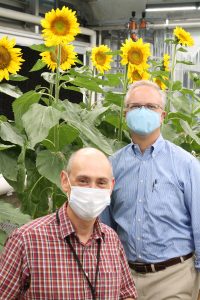Edison Agrosciences has the key to preventing a natural rubber apocalypse: sunflowers. Edison is an agricultural biotechnology company dedicated to developing a domestic source of natural rubber by improving an existing crop — sunflower.
Edison Agrosciences was founded in North Carolina by Matt Crisp, CEO of Benson Hill, and Tom Hohn, plant biotechnology expert. David Woodburn, C EO of Edison Agrosciences, was introduced to the company while an entrepreneur-in-residence with BioGenerator.
EO of Edison Agrosciences, was introduced to the company while an entrepreneur-in-residence with BioGenerator.
“I became an entrepreneur-in-residence at BioGenerator, assisting some of their portfolio companies with business development and assessing the prospects of new companies and technologies,” Woodburn said. “Edison Agrosciences was one of those portfolio companies.”
In 2019, the company moved to St. Louis and won an Arch Grant. Now located in the Helix Center in at 39 North, Edison is using multiple technical approaches to upregulate natural rubber accumulation in the leaves of sunflower plants.
According to Woodburn, nearly 90% of the world’s natural rubber is produced in Southeast Asia, but disease and distance make for an extremely fragile supply chain. Manufacturers rely on natural rubber in thousands of products because it has properties that can’t be matched with synthetic materials.
According to Woodburn, nearly 90% of the world’s natural rubber is produced in Southeast Asia, but disease and distance make for an extremely fragile supply chain. Manufacturers rely on natural rubber in thousands of products because it has properties that can’t be matched with synthetic materials.
“Believe it or not, even with the technology we have today, synthetic rubber doesn’t meet all the performance characteristics of natural rubber,” Woodburn says.
While the company says it can’t fully replace all the natural rubber production with just sunflowers, they can potentially meet 80% of the demand with their improved sunflowers. They plan to do this by improving the per-acre yield via plant improvements and agronomics, and then coordinating the closed-loop supply chain to supply domestic demand. U.S. sunflower fields today produce about 50,000 tons of natural rubber each year, but the concentration is too low for economical collection and extraction.
Edison Agrosciences was recently selected as part of the Wells Fargo Innovation Incubator (IN2) agtech cohort. IN2 is funded by the Wells Fargo Foundation and co-administered by the National Renewable Energy Laboratory (NREL). This program offers up to $250,000 in a non-dilutive award to validate their technologies in the world-class laboratories at NREL or the Donald Danforth Plant Science Center. NOTE insert link to the news release here
“Our current DARPA (Department of Advanced Research Projects Agency) work with the Danforth Center has laid the groundwork for a cutting-edge program of genomic selection and predictive advancement,” Woodburn said. “Through IN2, we’ll be expanding our existing sunflower diversity panel by characterizing an additional several hundred varieties of sunflower for more robust identification of genes that are important for rubber production.”
Woodburn says those genes will be candidates for engineering or selection and will facilitate establishment of genomics-driven rapid breeding program for high rubber content.
Learn more about Edison Agrosciences on their website here.
https://www.youtube.com/embed/6F_ijJgc2M0